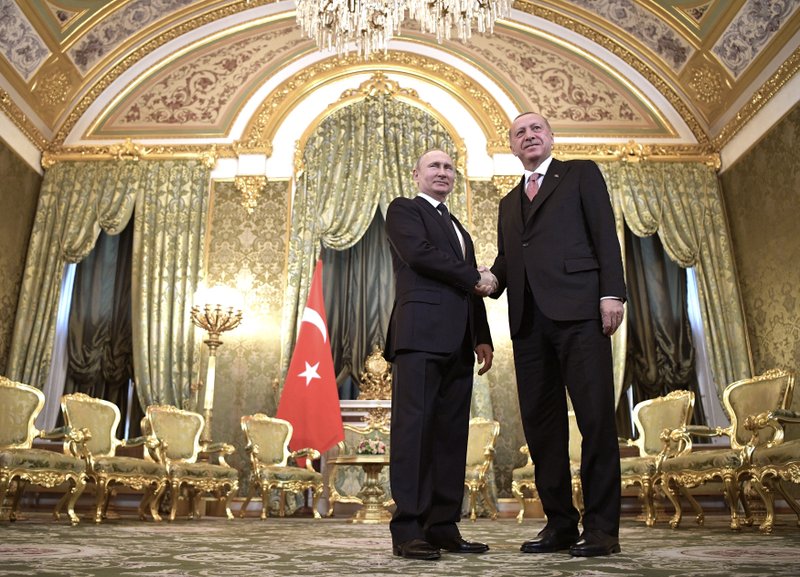ISTANBUL -- Turkey and Russia, which are cooperating in Syria's eight-year civil war despite supporting opposite sides, are facing a new escalation of violence in Syria's last rebel-held territory.
An offensive by Syrian government forces to capture Idlib in northwestern Syria raises the risk of a humanitarian crisis. The area is home to 3 million people.
Turkey, which is already hosting more than 3.6 million Syrian refugees, is facing pressure from Syria, Iran and Russia to deliver on its pledge to control the armed rebel factions in Idlib.
But Turkey wants Russia to rein in Syrian President Bashar Assad to prevent an outflow of refugees and to keep Turkish soldiers safe.
Turkish President Recep Tayyip Erdogan and Russian President Vladimir Putin "have an incentive to cooperate and ensure that nobody's interests are totally trampled," said Aaron Stein, director of the Middle East program at the Foreign Policy Research Institute, an American think tank.
In September, the two leaders met in the Russian resort city of Sochi and brokered a cease-fire for Idlib to prevent a bloody onslaught, despite the fact that Russia has firmly backed Assad and Turkey supports opposition forces. Nine months later, the truce has failed.
The agreement called for a 9- to 12-mile demilitarized zone free of insurgents and heavy weaponry and for two key highways crossing through Idlib to be reopened. The demilitarized zone has been breached, and the highways are at the center of the current government offensive.
Syrian ground forces have been advancing from the south of the rebel stronghold under the cover of Syrian and Russian airstrikes.
The Syrian Observatory for Human Rights said more than 291 civilians and 369 fighters have been killed since April 30 in the rebel stronghold. In the same period, 269 government troops and 22 civilians were killed in government areas by rebel fire. The U.N. children's agency said more than 130 children reportedly have been killed.
Already, more than 200,000 people from the stronghold have been displaced, according to the U.N., with some seeking safety near the border with Turkey while others cram into crowded camps in Syria.
Turkey has accused the Syrian government of violating the cease-fire, and Turkish Defense Minister Hulusi Akar said the country has told Russia that "the regime must be controlled."
Russia has launched airstrikes in Idlib and is providing air cover in the Syrian government offensive. Russia has complained that the militants have increasingly been targeting its military base in the nearby coastal province of Latakia.
But for now, analysts say, Moscow is unlikely to support an all-out Syrian operation in Idlib because the benefits of a long-term alliance with Turkey outweigh one military battle.
"Russia doesn't want to ruin its relationship with Turkey because of Idlib," says Kirill Semenov, a Moscow-based Middle East analyst and expert at the Russian International Affairs Council.
Erdogan and Putin have become close since 2016, rebuilding their relations after a crisis in 2015 when Turkey shot down a Russian jet near the Syrian border. Their rapport has grown stronger as Turkey's relations with the United States have grown fragile, especially over Washington's support of Syrian Kurdish-led forces who control large swaths in eastern Syria. Ankara considers them an extension of a Kurdish insurgency operating inside Turkey.
Erdogan is so far sticking to his promise to buy Russian-made S-400 missiles despite U.S. warnings that the system would jeopardize Turkey's participation in the F-35 fighter jet program and compromise its safety. Turkey is angling for a way to have both the S-400s and the F-35s.
Information for this article was contributed by Nataliya Vasilyeva and Sarah El Deeb of The Associated Press.
A Section on 06/02/2019
